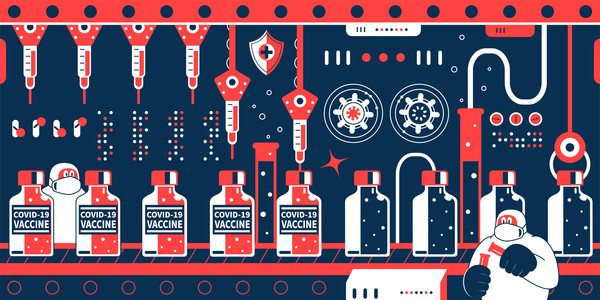Last Tuesday, a U.S. FDA expert committee recommended including the Omicron BA.4 and BA.5 subvariants in the Covid-19 booster shot in autumn. However, it quickly added that lengthy clinical trials could hinder the vaccines’ timely distribution, necessitating emerging technologies like computer simulations.

Computer simulation builds a mathematical model that mimics a real-world situation to conduct experiments to describe, explain, investigate, and predict the behavior of that situation. Recently, small clinical trials can take as little as five months, with an additional two months for manufacturing doses. Still, new variants have emerged within this period, outdating new vaccine formulations before they even receive approval.
Consequently, accelerated trials are already being considered as previous vaccine formulations were safely administered. However, many are still skeptical about this mRNA vaccine platform, and thus accelerated trials without sufficient evidence, might cause further concern leading to low vaccination rates and wastage.
Against this backdrop, the FDA has begun recognizing simulation-based product development and virtual prototyping as valuable tools to supplement experimental testing and clinical trials. By using simulation, manufacturing and clinical trials can be optimized to attain faster mRNA Covid-19 vaccines.
Optimization of manufacturing processes
Compared to other vaccines, the mRNA platform allows quick production scale-up because it is a cell-free manufacturing process. The technique can be further optimized, but many pharmaceutical plants still use the industry-standard batch manufacturing process. However, the inefficiencies of long lead times, intensive labor, scaled-up difficulties, and wastage are well known.
Pfizer and Moderna use a batch-manufacturing process for their mRNA Covid-19 vaccines but switching to a continuous or semi-continuous manufacturing system can reduce manufacturing cycles.
Continuous manufacturing (CM) enables pharmaceutical production from end to end on a single uninterrupted production line. However, high initial investments due to limited suppliers developing integrated systems for CM often deter many companies from adopting these processes.
While a tubular design for continuous manufacturing of viral component vaccines exists, the mRNA vaccine platform is relatively new and no such system has been created. Thus, simulation will play a crucial role in pioneering the facility requirements, such as maintaining the correct temperature throughout all manufacturing stages and harvesting and purification processes, among others.
Siemens recently published a report highlighting simulation as a tool to mitigate initial expenses for a continuous manufacturing system by designing and simulating the required virtual laboratory environment. Thus, if applied to the Covid-19 mRNA vaccine, each step can be optimized for obtaining the desired performance of the product by using the computational simulation software.
Application to clinical trials
Clinical trials and regulatory red tape often cause the longest hindrances regarding successful vaccine approval. Recruitment of participants, conducting the tests, and submitting for approval all take time but are crucial to ensure the vaccine’s safety.
It is possible to create a simplified “digital twin” using computer simulations to mimic the characteristics of different target groups. According to experts, the desired input parameters to create the necessary human environment can be obtained from last year’s clinical trials. Thus, the speed of clinical trials will be determined by the computer's processing speed, which will be faster than traditional clinical trials.
Not only is this beneficial for saving manufacturers time and money, but it also removes ethical concerns associated with clinical and pre-clinical trials. Simulation along with phantom and artificial human chip devices are emerging technologies with the potential to accelerate clinical trials.
These adjustments may take time but are worth considering as the Covid-19 virus is far from extinct and will require annual updates to keep pace with the quickly mutating Covid-19 variants.
“As we move into the fall and winter, we must have safe and effective vaccine boosters that can protect against circulating and emerging variants to prevent the most severe consequences of Covid-19,” an FDA official said.
Last week, Korea also launched its first Covid-19 vaccine, SKYCovione, a self-assembled nanoparticle vaccine. SK Bioscience is currently conducting clinical trials for a subsequent booster vaccine.

